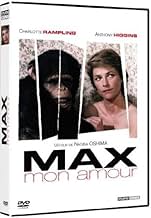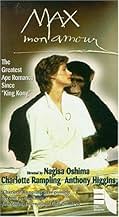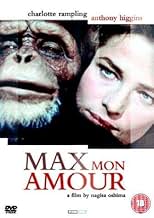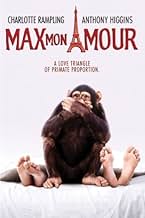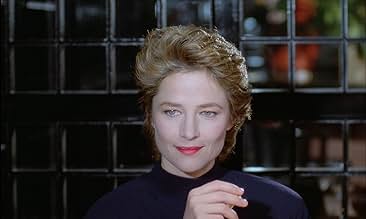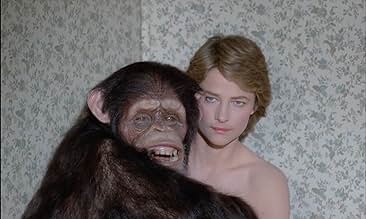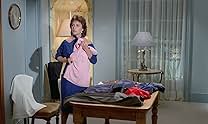Max mon amour
- 1986
- Tous publics
- 1h 32min
NOTE IMDb
6,0/10
1,4 k
MA NOTE
Une femme française mariée à un diplomate anglais en poste a Paris, prend pour amant un chimpanzé de zoo nommé Max..Une femme française mariée à un diplomate anglais en poste a Paris, prend pour amant un chimpanzé de zoo nommé Max..Une femme française mariée à un diplomate anglais en poste a Paris, prend pour amant un chimpanzé de zoo nommé Max..
- Réalisation
- Scénario
- Casting principal
- Récompenses
- 2 nominations au total
Bernard-Pierre Donnadieu
- Archibald
- (as Bernard Pierre Donnadieu)
Bonnafet Tarbouriech
- Le vétérinaire
- (as Pierre Bonnafet)
Avis à la une
Mainly, this film is about Charlotte Ramplings love for a monkey (a chimpanzee, to be precise), and how her family, especially her husband, deals with it. In fact, upon finding out about his wives affair, Anthony Higgins' character remains surprisingly calm; he even proposes to have the monkey live with them in their house. Maybe he wants to prevent Rampling from leaving him; or he does so since he has an affair himself; or it is his attempt to be "open minded" even in front of an utmost unusual matter. But problems soon up: Not only does the maid (young Victoria Abril!) respond negative to the new guest; the couples friends slowly find up about the hidden secret and try to "help" by drawing in psychologist, zoologists, and so forth. Then, suddenly, Max, the monkey is gone... Sounds weird? It is. All over the film, one is reminded of some of Luis Bunuels work. In one particular scene, Higgins eager to find if Rampling and Max do indeed share sexual experiences pays a prostitute to "visit" Max, about which she has no problems (other than Max!). One could read it as a commentary about, once again, the lifestyle of the Bourgeoisie and the boredom that drives them, but in fact all of the characters are likable and there's not hint of criticism on social inequalities. It's filmed in a "children film style" way, yet in its contents designed exclusively for adults. It makes for an enjoyable reception, but once you've seen it, it's not something you want to watch it all too soon, since "Max mon Amour" is basically attractive for the unpredictable unfolding of the story.
The premise of this film sounded just odd enough that I felt compelled to check it out at the MoMA showing last evening. I had to sit with it a day to determine exactly how I felt about it. It's definitely unusual. I found the beginning both interesting and funny, and I also enjoyed the open sequence and credits along with the score. However, the story progressed in such a way that it became clear, to me at least, that the story wasn't really developed beyond the surprise that Rampling's lover is a chimpanzee. The husbands initially accepts the situation but grows increasingly obsessed with what exactly his wife and chimp do when they're alone together, since she will not let him watch. He hires a prostitute to have sex with the monkey so he can see how it's done. There are other moments that are somewhat engaging, and the two lead performances are very good, but in the end, I found Max Mon Amour mostly unsatisfying and could have befitted from some prudent editing.
I watched this film as a part of a film class that I take. For the first time I really liked a Oshima film as I watched it and not only after we talked about it. The story crosses all kinds of lines of what love is and how it can be felt by anybody or anything. All and all a good film to see. Note that for 1986 Rick Bakers effects are the most life-like I have seen of a monkey. Sometimes you even think it is a the real thing
MAX, MON AMOUR received a tepid reaction when it debuted in Cannes in 1986, a French- American co-production under the rein of the late Japanese provocateur Nagisa Ôshima (1932- 2013), which would become his penultimate feature film.
Since then, it has become a succès de scandale which is less being watched than hyped due to its subversive content, but in fact, most of the time, it suffices as a tongue-in-cheek comedy, a marital satire borne out of Jean-Claude Carrière's urtext, Peter Jones (Higgins) is a liberal-minded British diplomat working and living in Paris, one day, to his utter dismay, he finds out the paramour of his wife Margaret (Rampling), is a male chimpanzee named Max, beggar belief, the couple decides to try out a kind of ménage-à-trois by bringing Max into their official residence, where also lives their towhead school-age son Nelson (Hovik), and believe it or not, in the end of the story, their co-habitation actually works.
Cagey about the salacious details of the relationship between Margaret and her "supposed" primate lover, Ôshima sides with the husband's point-of-view to parse the couple's tug-of-war, firstly, Peter takes up the gauntlet to show his magnanimity by accepting the situation without letting it get under his skin, then, driven by curiosity and jealousy, his attitude towards Max seesaws between hostility and respectable concern, an experiment of corroborating the inter- species sexual act is a bust, whereas an episode of shotgun scare is just a cheeky practice of cheap tension.
It is an immoral cock-and-bull story, menace is palpable, but vice has never descended into the picture and what sagaciously affirming is the film's brazen stance on the dynamism between the couple, it is always Margaret who has the say-so in their states of affairs, however preposterous and quixotic, there is a deep respect unites them as an entity, Peter stoutly fights her corner in the face of extrinsic parties, whether it is a zoologist or a neuropsychologist, accordingly, she also quite frank about her feelings, even stays on friendly terms with Peter's secretary-cum-lover Camille (a gratingly loud Diana Quick).
It is a surprise that Ôshima chooses not to go out on a limb in salting the plot by bestowing Max with a feral complexion, alternatively played by real chimps and stunts in verisimilar costumes (solely by this reviewer's reckoning), Max is presented as a meek pet, not dangerous, sulky at most, albeit his human-like size, even becomes mawkishly lovelorn and loses his appetite when Margaret is absent. Granted, there is a touching and tender naiveness seething beneath its surrealistic premise, which also is not exactly congruent with Ôshima's make-up if one might venture to surmise.
Both Rampling and Higgins tackle the thorny subject with bravura, what percolates from their collective effort is a beguilingly unfeigned sophistication stemming from a bourgeois background, and Ôshima conspiratorially sends up their caprices with deadpan seriousness, not to mention a non sequitur triumph appended to the part where Max momentarily goes missing in the woods.
Ultimately, MAX, MON AMOUR doesn't come to provoke moralists, but offers a keyhole for the audience to observe a behavioral pattern says as much of living beings' universality as their idiosyncrasy, the point is made, but reverberations are somewhat deadened when Ôshima settles for a middle road between "funny and die" in his overall approach.
Since then, it has become a succès de scandale which is less being watched than hyped due to its subversive content, but in fact, most of the time, it suffices as a tongue-in-cheek comedy, a marital satire borne out of Jean-Claude Carrière's urtext, Peter Jones (Higgins) is a liberal-minded British diplomat working and living in Paris, one day, to his utter dismay, he finds out the paramour of his wife Margaret (Rampling), is a male chimpanzee named Max, beggar belief, the couple decides to try out a kind of ménage-à-trois by bringing Max into their official residence, where also lives their towhead school-age son Nelson (Hovik), and believe it or not, in the end of the story, their co-habitation actually works.
Cagey about the salacious details of the relationship between Margaret and her "supposed" primate lover, Ôshima sides with the husband's point-of-view to parse the couple's tug-of-war, firstly, Peter takes up the gauntlet to show his magnanimity by accepting the situation without letting it get under his skin, then, driven by curiosity and jealousy, his attitude towards Max seesaws between hostility and respectable concern, an experiment of corroborating the inter- species sexual act is a bust, whereas an episode of shotgun scare is just a cheeky practice of cheap tension.
It is an immoral cock-and-bull story, menace is palpable, but vice has never descended into the picture and what sagaciously affirming is the film's brazen stance on the dynamism between the couple, it is always Margaret who has the say-so in their states of affairs, however preposterous and quixotic, there is a deep respect unites them as an entity, Peter stoutly fights her corner in the face of extrinsic parties, whether it is a zoologist or a neuropsychologist, accordingly, she also quite frank about her feelings, even stays on friendly terms with Peter's secretary-cum-lover Camille (a gratingly loud Diana Quick).
It is a surprise that Ôshima chooses not to go out on a limb in salting the plot by bestowing Max with a feral complexion, alternatively played by real chimps and stunts in verisimilar costumes (solely by this reviewer's reckoning), Max is presented as a meek pet, not dangerous, sulky at most, albeit his human-like size, even becomes mawkishly lovelorn and loses his appetite when Margaret is absent. Granted, there is a touching and tender naiveness seething beneath its surrealistic premise, which also is not exactly congruent with Ôshima's make-up if one might venture to surmise.
Both Rampling and Higgins tackle the thorny subject with bravura, what percolates from their collective effort is a beguilingly unfeigned sophistication stemming from a bourgeois background, and Ôshima conspiratorially sends up their caprices with deadpan seriousness, not to mention a non sequitur triumph appended to the part where Max momentarily goes missing in the woods.
Ultimately, MAX, MON AMOUR doesn't come to provoke moralists, but offers a keyhole for the audience to observe a behavioral pattern says as much of living beings' universality as their idiosyncrasy, the point is made, but reverberations are somewhat deadened when Ôshima settles for a middle road between "funny and die" in his overall approach.
The first question one must ask upon coming across this title is "what?" The second question, surely, is "how can this possibly be sustained for the entirety of a full-length feature?" The answer is more common and less interesting, and less sensational, than you'd think from the outside looking in. Despite the premise, 'Max mon amour' isn't a sex comedy centered around bestiality. There is comedy, yes, and a facet of just such a taboo, but by and large the picture carries elements that are decidedly less remarkable. This isn't to say that the movie is inherently worse off just because it dallies with such story ideas - an open secret that a couple is keeping, and in particular the open secret of a lover or two outside their marriage; the hijinks of a highly excitable animal living within a home (think 'Beethoven' for comparison); the tension that arises between the central characters based on these ideas. Only, if you think based on a one-line synopsis that the picture is going to be something extraordinary, it really isn't. And for that matter, it's more of a comedy-drama, lightly exploring what such a scenario might earnestly look like in real life; some scenes are more farcical, others are more serious. For all that, this is quite enjoyable, even if it perhaps isn't anything one needs to go out of their way to see.
For what it's worth, this is solidly made. The screenplay whipped up between filmmaker Nagisa Oshima and co-writer Jean-Claude Carrière is curious, but refreshingly earnest in its storytelling even at its most ridiculous. Oshima's direction is commendably strong, and the cinematography of Raoul Coutard; the production design and art direction are splendid. There are tawdry notions dancing on the edge of racism (note a childish use of blackface at one point); the more ponderous beats surrounding the title character bring topics to the surface of animals' emotional intelligence, health, and welfare, but these are not specifically examined with major depth. But still, at its heart this is a feature that broaches its subject matter with total sincerity, to the point that its characters, dialogue, scene writing, and overall narrative are just as real and believable as though in most any title. This is unquestionably reflected in the acting, with performances from all - not least chief stars Charlotte Rampling and Anthony Higgins - that are as reliably sturdy as we would expect anywhere else. Throw in a bit of lighthearted silliness for good measure, and that's a wrap.
This is, to my surprise, a rather pleasant watch. It could have pushed boundaries and buttons, it could have been raunchy, it could have been total slapstick. What we get instead is less readily eye-catching, maybe, but more lastingly engaging and worthwhile. I don't think it achieves any big peak of storytelling at any point, and isn't so singular as to demand viewership. Yet whatever concerns one might have about the title based on the premise are laid to rest quite quickly, and the actual result is, gratifyingly, reasonably compelling as a detached but realistic approach is adopted. Oshima, Carrière, and all others involved are to be commended for defying assumptions, and for not taking the easy path. There's honest craftsmanship in every component part here, and I'm happy to say it's more deserving than it sounds when one first comes across it. Whether you're a fan of someone involved, extra curious, or just an avid cinephile, 'Max mon amour' isn't a must-see, but it really is a fine way to spend ninety minutes if you have the chance to watch.
For what it's worth, this is solidly made. The screenplay whipped up between filmmaker Nagisa Oshima and co-writer Jean-Claude Carrière is curious, but refreshingly earnest in its storytelling even at its most ridiculous. Oshima's direction is commendably strong, and the cinematography of Raoul Coutard; the production design and art direction are splendid. There are tawdry notions dancing on the edge of racism (note a childish use of blackface at one point); the more ponderous beats surrounding the title character bring topics to the surface of animals' emotional intelligence, health, and welfare, but these are not specifically examined with major depth. But still, at its heart this is a feature that broaches its subject matter with total sincerity, to the point that its characters, dialogue, scene writing, and overall narrative are just as real and believable as though in most any title. This is unquestionably reflected in the acting, with performances from all - not least chief stars Charlotte Rampling and Anthony Higgins - that are as reliably sturdy as we would expect anywhere else. Throw in a bit of lighthearted silliness for good measure, and that's a wrap.
This is, to my surprise, a rather pleasant watch. It could have pushed boundaries and buttons, it could have been raunchy, it could have been total slapstick. What we get instead is less readily eye-catching, maybe, but more lastingly engaging and worthwhile. I don't think it achieves any big peak of storytelling at any point, and isn't so singular as to demand viewership. Yet whatever concerns one might have about the title based on the premise are laid to rest quite quickly, and the actual result is, gratifyingly, reasonably compelling as a detached but realistic approach is adopted. Oshima, Carrière, and all others involved are to be commended for defying assumptions, and for not taking the easy path. There's honest craftsmanship in every component part here, and I'm happy to say it's more deserving than it sounds when one first comes across it. Whether you're a fan of someone involved, extra curious, or just an avid cinephile, 'Max mon amour' isn't a must-see, but it really is a fine way to spend ninety minutes if you have the chance to watch.
Le saviez-vous
- AnecdotesOshima originally intended there to be a scene where Max performs cunnilingus on Margaret, but ultimately decided it would be too risque for French cinema.
- ConnexionsFeatured in The Look (2011)
Meilleurs choix
Connectez-vous pour évaluer et suivre la liste de favoris afin de recevoir des recommandations personnalisées
- How long is Max My Love?Alimenté par Alexa
Détails
- Date de sortie
- Pays d’origine
- Langues
- Aussi connu sous le nom de
- Max My Love
- Lieux de tournage
- Sociétés de production
- Voir plus de crédits d'entreprise sur IMDbPro
Contribuer à cette page
Suggérer une modification ou ajouter du contenu manquant


